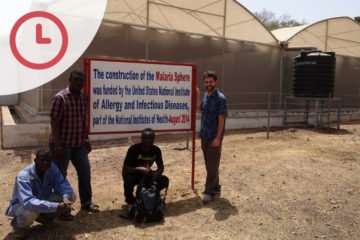Podcast Available on iTunes and Spotify.
Hello, I’m Thomas Locke and this is Five Minutes, the podcast that brings you closer to the people fighting malaria.
Today I’m joined by Dr Mark Amos to discuss the accuracy of malaria testing. So, how accurate are Rapid Diagnostic Tests, or RTDs, tools that are becoming increasingly popular? And how do they compare to traditional lab testing?
This is Five Minutes with Dr Mark Amos.
Mark thanks for joining me.
Thank you very much.
Talk me through how you’re assessing the accuracy of malaria testing.
This is essentially a validity study. We’ve been comparing two methods of diagnosis. We’ve been comparing field diagnostic methods with lab-based methods. And we’re assuming that lab-based methods here are the gold standard against which we’re judging the accuracy both in terms of false negatives and false positives for testing administered in the field.
Presumably, field tests are more accessible than lab testing?
They are, there are a number of advantages to field testing. It’s very rapid so you can give a diagnosis to the potential patient straight away. You can also carry it with you so you don’t need people to turn up to a lab or worry about transport. The concern is that it is being tested in an uncontrolled environment, which is why we wanted to look at the accuracy of the testing mechanisms available.
How did you conduct this research and what were the outcomes?
Our research was using Demographic and Health Survey data which is available from the DHS website. We found that there was a reasonable degree of accuracy in most cases, but there was some variation in the degree of accuracy and testing depending on the interview team. Now, for false positives, this was actually around about 15% of variation in the level of false positives was attributable to the interview team. However, we did actually find for false negatives, that around 48% of variation in the rate of false negatives was attributable to the interview team. Now, obviously false positives are reasonably serious, Malawi is resource-poor setting. We prefer not to have false positives if it’s all possible, it’s a bit of a waste of resources. However, probably false negatives are, in a sense, the more serious false diagnosis, you’re potentially saying to someone who does have malaria that they’re okay. That has a number of implications, it may delay them seeking care or treatment for malaria or it may actually put more seeking care treatment for malaria at all.
What sort of data did you collect?
So the data we’re using is actually secondary data. It was collected by the DHS program in Malawi and we access their data remotely. We have two measures within the dataset: the diagnosis from the field test and the diagnosis from a lab-based result, and we simply compared the two.
The DHS, is that state-owned by the Malawian government, is it USAID, who owns the data?
It’s funded by USAID, it’s a survey that has been running for a number of decades, it started off as the world fertility survey. It’s a series of cross-sectional surveys in all areas, where there are reasonably high levels of fertility. It captures a number of dimensions of data that might be useful ranging from contraceptive use, maternal health care utilization, to things like AIDS prevalence or the prevalence of malaria.
You found out that there is some degree of accuracy with both methods of testing. What are your next steps?
There are two major steps. Firstly, although there is some variability in false diagnosis, in a way the fact that we’re attributing this to interviews is actually a reasonably positive step forward, it is actually something we can do about it. It’s not a function of the underlying test, it’s a function of the interview a team administering the test. So there might be potential ways of looking at better training or encouraging interviews to deliver tests in a different way, which might actually increase the accuracy so there’s a kind of a positive policy story type there. The other major thing that we want to do going forward is we want to expand our analysis to look at, hopefully, all of the demographic and health survey datasets across sub-Saharan Africa. So we’ll be able to compare between countries and see sort of whether there is something unusual about Malawi or whether this is a generalizable finding.
Dr Mark Amos, thank you.
Thank you very much.
If you’d like to learn more about Dr Mark Amos’ study, it’s called ‘Field interviewer effects on the quality of malaria diagnosis in Malawi’ and can be accessed here.


